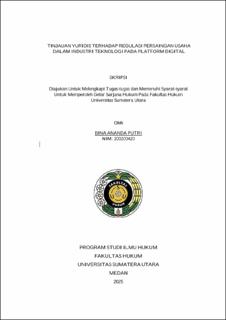| dc.description.abstract | The development of digital technology has changed the era of conventional economy into digital economy. The presence of Law No. 5 of 1999 is the main foundation in regulating business competition in Indonesia. However, adaptation to the rapidly changing digital context is still a challenge, given the market characteristics that are significantly different from conventional markets. Regulations governing business competition in Indonesia in the digital era have not been specifically formulated. This study aims to explore how current business competition regulations can be applied to address challenges that arise on digital platforms, such as anti-competition, restrictions on market access, and the influence of dominant forces.
This study uses a normative legal research method. Therefore, the data used includes primary, secondary and tertiary legal materials. Data were collected using library research techniques. Furthermore, the data were analyzed using qualitative data analysis methods.
The results of the study conclude that business competition in the digital era creates new challenges that require adjustments in competition regulations and policies, challenges such as digital monopoly, market dominance by several large companies, and injustice in the distribution of resources. In addition, unfair competition practices, such as misuse of personal data and price discrimination, are becoming increasingly difficult to identify and overcome. Current regulations are not fully adequate to handle the complexity and speed of change in the digital world, making supervision and law enforcement more complicated. One of the regulations that have been formed related to digital platforms is Law No. 7 of 2014 concerning Trade, Law No. 1 of 2024 concerning the Second Amendment to Law No. 11 of 2008 concerning Information and Electronic Transactions, PP No. 80 of 2019 concerning Trade Through Electronic Systems, existing regulations are also still limited in terms of handling specific problems related to the digital ecosystem, such as policies regarding algorithms, abuse of dominant positions, and consumer protection in digital transactions. Therefore, the development and adjustment of legal regulations are needed to be able to overcome the challenges that arise and create healthy business competition in the digital world.
Keywords: legal reform, business competition, digital economy | en_US |


